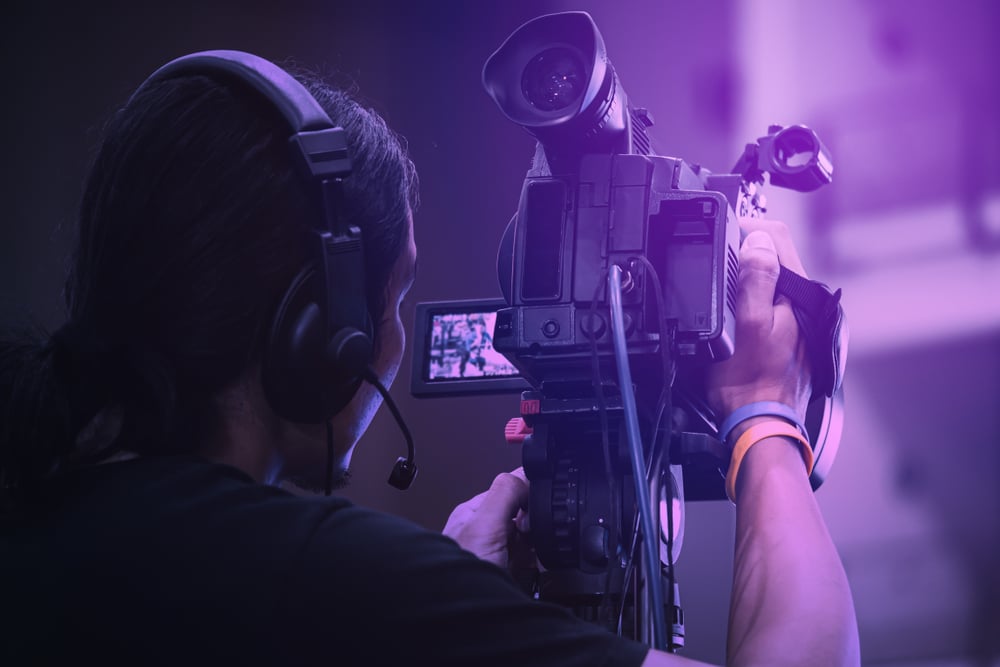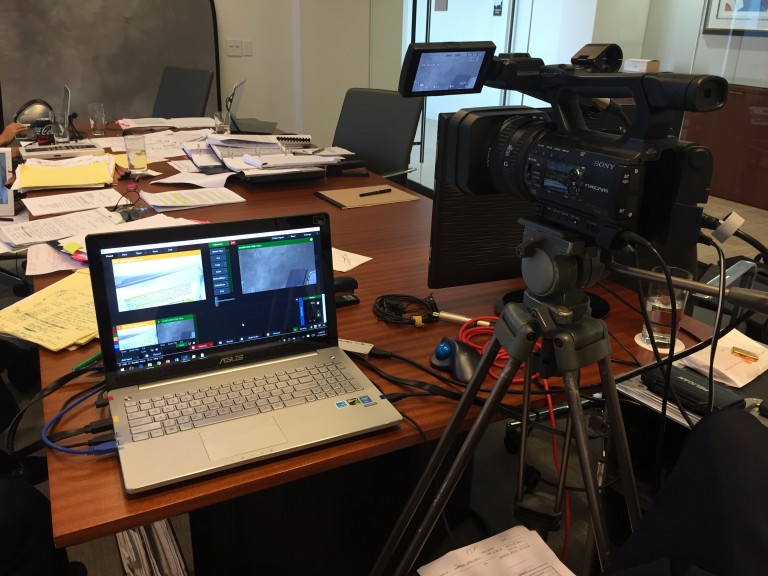The Importance of Lawful Video Clip Depositions in Modern Legal Solutions: What You Ought to Know
Legal video clip depositions have actually ended up being important in today's lawful landscape. They provide a multidimensional sight of witness testaments that standard transcripts simply can not match. By recording both non-verbal and verbal interaction, these depositions improve the overall understanding of a witness's reliability. However, the performance of video depositions hinges on numerous aspects, including conformity with legal standards and finest methods (legal video depositions). Discovering these aspects discloses their true value in contemporary lawful services
What Are Lawful Video Depositions?
Lawful video clip depositions work as an important device in the lawsuits process. They include videotaping witness statements in a video clip layout, capturing both non-verbal and spoken communication. This technique allows lawyers to record the behavior, expressions, and responses of witnesses, giving a richer context for the testimony. Usually carried out in a regulated setting, these depositions are led by lawyers that ask questions while a stenotype reporter documents the dialogue. The resulting video can be critical for test preparation, as it enables attorneys to evaluate the reputation of witnesses and refine their techniques. Furthermore, lawful video clip depositions can be used in various legal contexts, ranging from civil disagreements to criminal instances. The auditory and visual aspects of video clip depositions boost the discussion of proof, making it an essential component in the modern legal landscape. Overall, they add considerably to the efficiency and effectiveness of lawful process.

Advantages of Video Depositions Over Standard Techniques
Video depositions provide various advantages contrasted to standard methods of taking witness testimonies. One substantial benefit is the capacity to record both audio and aesthetic components, offering a much more complete record of the witness's statements. This dual layout boosts clearness and enables legal experts to reference specific subtleties throughout trial preparation. In addition, video clip depositions help with remote participation, making it easier for witnesses that may be inaccessible for in-person looks because of geographical restraints or health issues.Moreover, video depositions can quicken the total deposition procedure, decreasing the moment and costs associated with traveling and logistics. They also boost availability, as tape-recorded depositions can be conveniently shared among lawful groups and referenced at any kind of time. This comfort contributes to better case monitoring and preparation. On the whole, video clip depositions represent a contemporary, efficient technique to gathering witness testaments, aligning with the advancing needs of the lawful profession.
The Function of Body Movement and Tone in Testimonies

In legal video clip depositions, body language and tone play crucial duties in conveying a witness's integrity and credibility. Nonverbal signs can offer understandings into a witness's psychological state, affecting exactly how their statement is regarded. Understanding the impact of these aspects is crucial for attorneys and jurors alike when examining the integrity of a testament.
Nonverbal Communication Insights
While verbal communication is typically highlighted in lawful testaments, nonverbal signs such as body language and tone play a necessary duty in communicating trustworthiness and feeling. Onlookers of depositions might keep in mind that a witness's position, motions, and facial expressions can considerably affect perceptions of reliability. Regular eye call may signify self-confidence, while staying clear of stare can recommend dishonesty or discomfort. Similarly, the intonation-- its rate, pitch, and quantity-- can give sensations of sincerity or uncertainty. Attorneys need to be in harmony with these nonverbal signals, as they typically offer crucial context that enhances talked words. Understanding these nuances can improve the effectiveness of depositions and affect the outcome of lawful process.
Emotional Tone Impact
The psychological tone communicated throughout lawful testimonies substantially impacts how a witness is regarded. Body language, singing inflections, and faces play vital functions fit the story of a testimony. A witness showing self-confidence through constant eye get in touch with and a tranquil tone can instill a feeling of reliability and interaction. Conversely, indications of anxiety, such as fidgeting or a shaky voice, may bring about uncertainty regarding their account. The nuances of emotional expression can affect the analysis of facts, making it necessary for attorneys to recognize these hints. In video clip depositions, the auditory and visual elements combine, highlighting the value of emotional tone in communicating genuineness and reliability within the legal process.
Reputation and Trustworthiness
A crucial consider establishing integrity and trustworthiness during statements depends on the witness's body movement and intonation. Viewers frequently depend on non-verbal hints-- such as eye get in touch with, position, and gestures-- to examine a witness's genuineness. For circumstances, a witness that keeps eye call and presents open body language may be perceived as more trustworthy and straightforward than one that stays clear of eye call or shows up shut off. Additionally, intonation plays an essential duty; a constant, tranquil tone can strengthen the integrity of the statement, while fluctuations in pitch or volume might increase questions. Ultimately, the mix of body movement and vocal tone greatly affects just how a witness's statements are received and analyzed in a lawful context.
Best Practices for Performing Video Clip Depositions
Carrying out video clip depositions needs cautious planning and implementation to ensure a reliable and clear presentation of testimony. It is crucial to choose a silent, well-lit place to decrease diversions and protected optimum video top quality. The equipment needs to be evaluated in breakthrough, including electronic cameras, microphones, and illumination, to stay clear of technical concerns during the deposition.Next, celebrations involved should assess the style and treatments beforehand, making certain that every person comprehends their duties. The deponent should be informed on the procedure, including exactly how to react clearly and concisely.Additionally, preserving a professional attitude throughout the session is important. This consists of avoiding from speaking over each other and confirming that all questions are guided properly. Ultimately, it is essential to tape-record the deposition in a style that enables simple playback and evaluation, maintaining the integrity of the testimony for future use.
Legal Factors To Consider and Conformity Issues
How do legal considerations and compliance issues affect the efficiency of video depositions? Legal professionals should navigate a complicated landscape of guidelines, making certain that video clip depositions abide by administrative regulations and criteria. Compliance with laws concerning personal privacy, permission, and tape-recording techniques is vital. Acquiring explicit consent from all events entailed is wikipedia reference needed to prevent legal repercussions.Additionally, the admissibility of video clip proof in court can hinge on compliance with procedural requirements. Ensuring that the tools made use of meets technical criteria is also crucial, as bad quality can weaken the deposition's reliability.Moreover, lawyers must know any kind of specific state legislations that regulate video clip depositions, as these can vary considerably. Failure to resolve these factors to consider can not only endanger the integrity of the deposition yet likewise impact the total case approach, inevitably affecting the customer's legal end results.
How Video Clip Depositions Impact Court Understanding
While video clip depositions can act as powerful tools in lawful procedures, their impact on jury assumption is significant. The aesthetic and acoustic elements of video clip recordings offer jurors with an extra complete understanding of witness disposition, credibility, and emotional feedbacks. This multimedia method can boost the jurors' ability to evaluate the integrity of testimony compared to typical text-based transcripts.Moreover, video depositions enable jurors to observe body movement, tone of voice, and faces, all of which can affect their analysis of the witness's declarations. The presence of a witness on screen can humanize them, promoting compassion and link, which might persuade jurors' point of views. Conversely, a witness who appears incredibly elusive or unreliable on video clip may result in adverse assumptions that influence a jury's decision. Eventually, the dynamic nature of video depositions plays a crucial duty in forming just how jurors interpret evidence and reach their decisions.
The Future of Video Depositions in Legal Method
As improvements in modern technology remain to improve the lawful landscape, the future of video clip depositions is positioned for substantial advancement. Technologies such as expert system, online reality, and improved video conferencing tools are expected to improve the deposition process and improve ease of access. Legal professionals may utilize AI-driven analytics to assess witness reliability and case strength more effectively.Moreover, the assimilation of digital truth might enable juries to experience immersive simulations of depositions, providing much deeper context and understanding. In addition, the pattern toward remote depositions is likely to linger, using higher flexibility for attorneys and customers alike.As remote job comes to be progressively normalized, video clip depositions will likely end up being conventional practice, reducing costs and time restraints connected with conventional methods. On the whole, these technological advancements assure to improve the performance, efficiency, and accessibility of video depositions in lawful practice, eventually transforming just how attorneys prepare for test.
Frequently Asked Questions
Just How Much Do Lawful Video Depositions Usually Expense?

Can Video Depositions Be Utilized in Any Kind of Case?
Video depositions can be made use of in various kinds of instances, including civil, criminal, and household law. Their versatility permits attorneys to present witness statements efficiently, adjusting to the details needs of various lawful situations.
What Equipment Is Required for a Video Clip Deposition?
To conduct a video clip deposition, vital tools consists of a premium electronic camera, microphone, lighting, and a reputable recording tool. In addition, a computer with editing software application might be essential for post-production and formatting the last video.
For how long Does a Normal Video Clip Deposition Last?
A regular video clip deposition lasts in between two to four hours, depending on the complexity of the case and the variety of inquiries presented. Prolonged sessions might happen, however breaks are normally integrated for individual convenience.

Are Video Clip Depositions Admissible in Court?
Video depositions moved here are generally admissible in court, provided they abide by legal standards and rules of evidence. Their usage boosts quality and maintains witness statement, helping in the judicial process during hearings and trials. Lawful video clip depositions have actually ended up being necessary in today's legal landscape. Furthermore, legal video clip depositions can be made use of in numerous legal contexts, ranging from civil disputes to criminal instances. In addition, video clip depositions help with remote involvement, making it simpler for witnesses who might be inaccessible for in-person appearances due to geographical constraints or health issues.Moreover, video clip depositions can accelerate the overall deposition procedure, reducing the time and expenses associated with traveling and logistics. Making certain that the devices used fulfills technological standards is additionally crucial, as poor top quality can weaken the deposition's reliability.Moreover, lawyers should be Full Report aware of any type of particular state regulations that regulate video depositions, as these can differ greatly. In addition, the pattern towards remote depositions is likely to linger, providing better versatility for customers and attorneys alike.As remote job ends up being significantly normalized, video clip depositions will likely become typical method, lowering costs and time restraints associated with typical methods.
Comments on “How attorneys can use legal video depositions to verify inconsistent testimony”